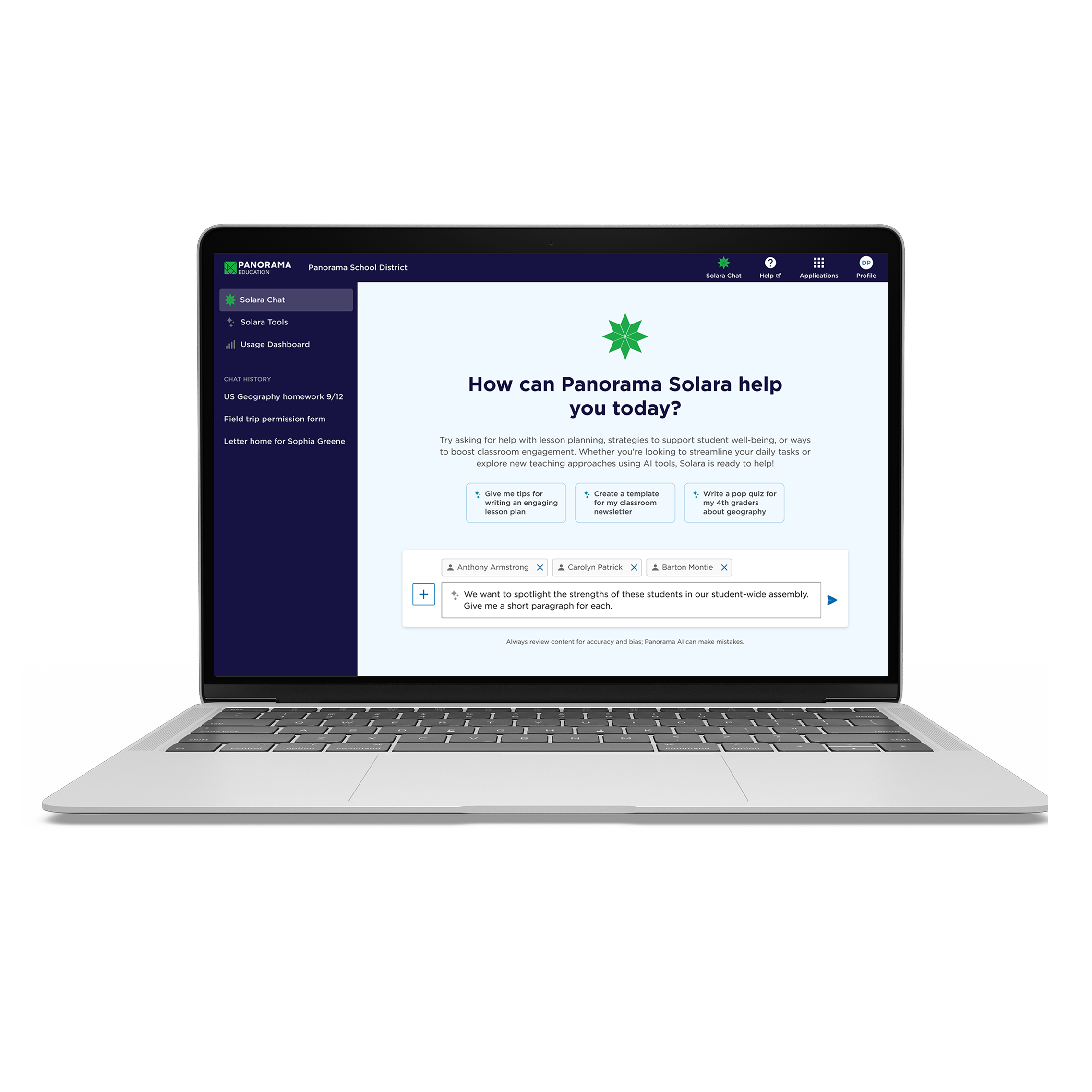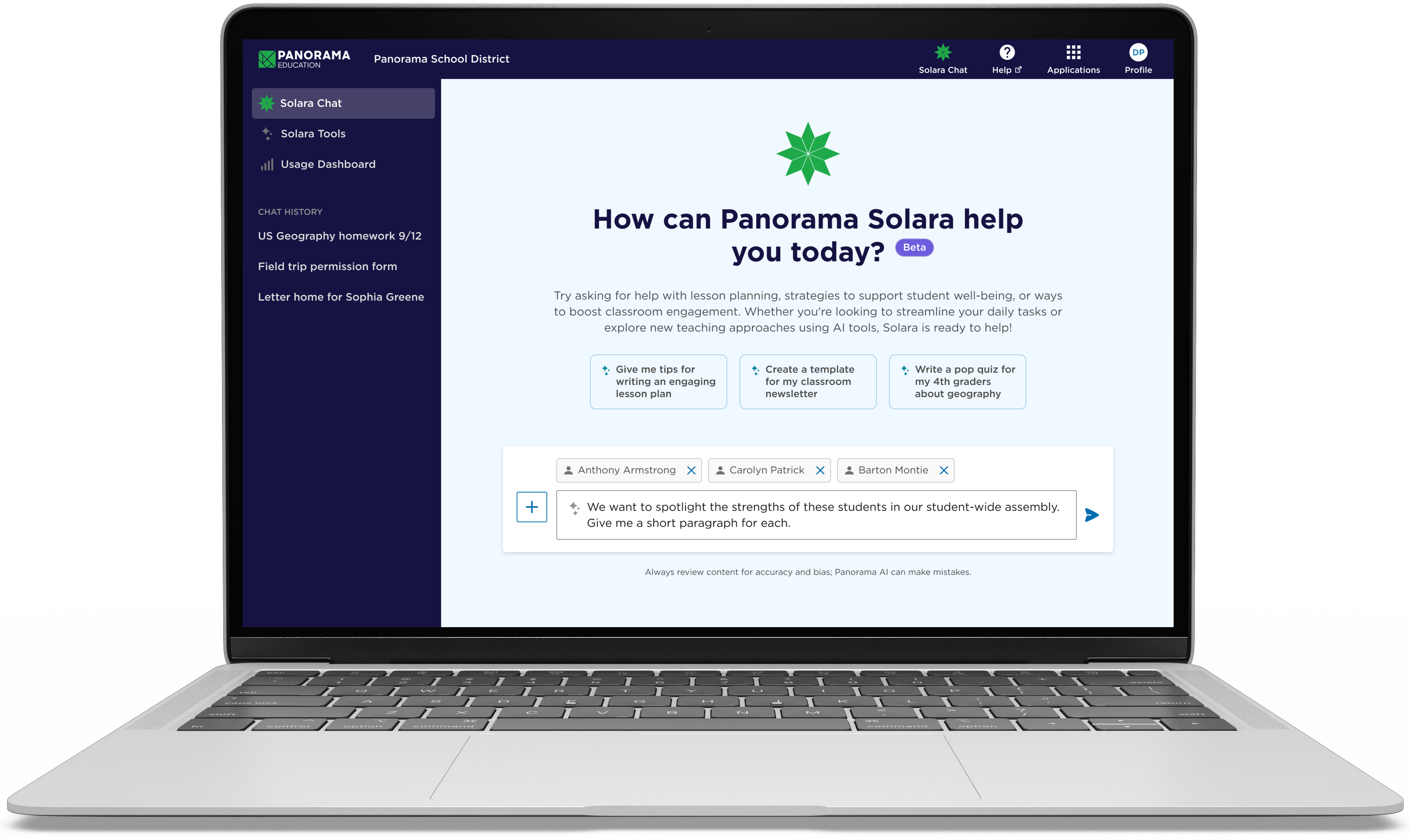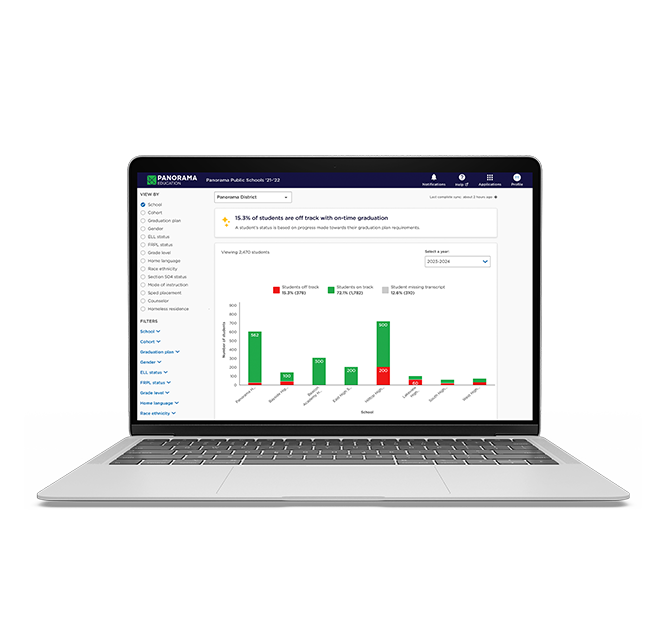With four schools and over 2,300 students, Laguna Beach Unified School District (LBUSD) in Laguna Beach, California is committed to providing personalized support that helps every student thrive.
The district has long prioritized data-driven decision-making, establishing strong systems for reviewing and responding to student needs. To enhance this work, LBUSD adopted Panorama Solara as a valuable tool that provides real-time data, allowing for greater agility in addressing chronic absenteeism, behavioral challenges, and academic needs.
Michael Keller, Ed.D., Director of Social and Emotional Support at LBUSD, shared how
Panorama Solara’s secure AI is helping the district strengthen its existing practices and provide
responsive, student-centered support.
Challenge: Tackling Attendance, Behavior, and Academic Gaps Post-Pandemic
-
Laguna Beach Unified School District struggled with disconnected data across multiple systems, making it difficult to identify and support at-risk students.
-
Rising chronic absenteeism (over 20%) and increasing behavioral challenges in early grades created urgency for better interventions.
-
A drop in 11th-grade math scores highlighted the need for deeper academic insights.
Solution: Using Panorama Solara to Identify Student Needs and Streamline Interventions
- Panorama Solara offered a secure platform to use generative AI to rapidly implement strategies.
- Tools like PowerSearch helped LBUSD quickly identify and prioritize students who needed support the most.
- Solara’s generative AI applications, such as nudge letters and personalized intervention plans, made communication with families and student support more efficient.
Impact: Better Student Support, Faster
-
LBUSD educators now save time with faster, data-driven student identification and intervention planning.
-
Attendance, behavior, and academic supports are more personalized and proactive, improving student outcomes.
-
Solara has empowered LBUSD to think more creatively about student challenges, continuously improving how the district supports every learner.
Challenge: Tackling Attendance, Behavior, and Academic Gaps Post-Pandemic
Laguna Beach Unified School District (LBUSD) had all the data it needed to support students: attendance records, assessment scores, behavioral reports, and student progress metrics. But the district’s biggest challenge wasn’t a lack of information—it was how disconnected that information was.
“We were looking for a single tool that helps us integrate a variety of different data sources,” said Dr. Keller. “We have our student information system that collects attendance data. We also have some report card data in that system. We have another information system that collects assessment data—essentially, we had a variety of different pieces that were just dispersed across different systems.”
Without one central platform to surface insights, educators were left piecing things together manually. And as the district emerged from the pandemic, the need for better, faster data-driven decision-making became increasingly urgent.
Chronic absenteeism had climbed above 20%, making student engagement a growing concern. At the same time, early-grade behavioral challenges were rising, with teachers reporting an increase in high-frequency, high-intensity disruptions in TK-2 classrooms. And in the upper grades, LBUSD saw an unexpected drop in 11th-grade math scores, an anomaly that didn’t align with students’ strong performance in AP and Pre-Calculus coursework.
“We had a really interesting drop in our 11th-grade math scores,” Dr. Keller recalled. “It just didn’t make sense for our student population, given their achievement in their coursework and their grades in class.”
LBUSD needed a way to connect the dots between trends—to not only see what was happening but to understand why and intervene sooner.
Solution: Using Panorama Solara to Identify Student Needs and Streamline Interventions
In 2023, LBUSD partnered with Panorama Education to streamline its student data systems, creating a single system where attendance, behavior, and academic performance could be viewed holistically. A year later, the district took its efforts a step further by introducing Panorama Solara, a customizable, district-wide AI platform designed to surface insights, automate interventions, and support educators in personalizing student support.
Solara integrates directly with Panorama Student Success, allowing educators at LBUSD to securely reference student information and generate individualized insights tailored to their district’s needs.
Impact: A New Level of AI-Enhanced Decision-Making
Dynamically Personalized SMART Goals
Before partnering with Panorama, finding at-risk students meant LBUSD teams had to cross-reference multiple platforms. Now, with Power Search (an AI feature in Student Success), LBUSD’s teams can instantly filter and flag students who needed support based on attendance, behavior, or academic concerns.
Demo data displayed
“Power Search has been a game changer for us because it quickly identifies the right students who need support,” said Dr. Keller. “I want to know whose attendance is trending in the wrong direction—who are our highest-priority students? With Power Search, our team can generate a list of the top two, three, five, or ten students who need attention. From there, we can start working with families, investigating the reasons behind absences, and developing intervention plans to support those students.”
Once the highest-priority students are identified, the next step is uncovering deeper insights into their needs. The platform's Insights feature generates three key takeaways from each student’s profile, providing a more comprehensive understanding of their situation.
For example, Insights can highlight a student’s attendance challenges alongside academic and behavioral concerns, including patterns that might have otherwise gone unnoticed. At the same time, it surfaces strengths, providing a more holistic view of the student’s progress and needs. This deeper understanding enables educators to develop targeted, well-rounded intervention strategies that address both challenges and areas of growth.
Identifying students was just the first step. Next, LBUSD needed a way to set clear, actionable goals for students without requiring hours of manual planning.
Demo data displayed
“What is awesome about the Solara Chat tool is we’re able to copy that student profile—with key insights—and then have the tool generate a variety of different SMART goals for us. These goals are drivers for student change,” Dr. Keller said.
This meant that instead of starting from scratch every time an intervention was needed, school teams could leverage AI-generated, data-informed goals that were immediately actionable.
“These are high-quality goals for us to really make important changes for kids,” Dr. Keller added. “It’s personalized. It’s data-informed. And it saves us so much time.”
Stronger Compliance and Personalization in 504 and Student Support Plans
Beyond attendance, Solara has significantly improved the efficiency and accuracy of 504 plans and Student Support Team (SST) processes. Instead of relying on generic, one-size-fits-all accommodations, LBUSD now uses Solara to generate truly individualized support plans that align with district policies and legal requirements.
“Our school counselors, who are our case managers for 504, use this tool because, on the back end, it’s got access to such a rich amount of information,” Dr. Keller said. ““In this particular use case, we’ve uploaded our 504 user manual and procedural safeguards to Solara, along with other key documents. It effectively uses that information to ensure that when we ask a question, the response is accurate and aligned with our established protocols—which is really, really amazing.”
With Solara’s ability to read through uploaded documents and align responses with district guidelines, the district ensures that every recommendation is compliant, meaningful, and tailored to the student’s actual needs. This reduces administrative burden while improving the quality of student accommodations.
Personalized Learning Through AI-Generated Reading Passages
Solara’s impact isn’t limited to interventions—it’s also enhancing classroom learning by making instruction more engaging and student-centered. The platform’s leveled reading passage generator allows educators to create reading assignments that match both a student’s reading level and their interests.
“We have a great custom tool (in Solara) that generates leveled reading passages tailored to each student,” Dr. Keller explained. “What’s really exciting is that it doesn’t just match students to the right Lexile level—it also personalizes content based on their interests. That’s what I think about when we talk about AI: truly personalized learning experiences. If a student loves surfing, I can generate stories about surfing. If another student is into art, I can create reading passages centered around art.”
Demo data displayed
Beyond personalization, the tool integrates with subject areas to create multidisciplinary learning experiences. “You can align reading passages with specific English language arts standards, but you can also pull in other subjects,” Dr. Keller said. “For example, if you’re teaching about the life cycle of water, the reading passage can seamlessly incorporate science concepts while staying at the right reading level for the student.”
The tool also guides teachers by providing feedback on each passage it generates. “It reinforces that the passage is at the appropriate Lexile level, outlines the key concepts, and even generates comprehension questions or discussion prompts,” Dr. Keller said. “And then there’s this extension piece—how do you build on what students have learned? The tool suggests additional activities, like creating a comic strip or another hands-on learning opportunity.”
What makes this tool even more powerful for multilingual learners and students with special needs is its ability to adapt. “You can ask a follow-up question like, ‘Translate this passage into Spanish,’ or any other language available,” Dr. Keller said. “Or, if I want to pre-teach vocabulary, I can have it generate a list of ten key words from the passage, complete with definitions and example sentences.”
For Dr. Keller, these features open new doors for differentiated instruction, ensuring that every student—regardless of reading level, language background, or learning needs—has access to meaningful, engaging content.
A Future-Focused Approach to AI in Education
Looking ahead, LBUSD is committed to expanding its use of AI tools to further support educators and personalize student learning. The district sees artificial intelligence not as a replacement for human decision-making, but as a tool to make interventions more effective, instruction more engaging, and student support more precise. As they continue exploring AI’s potential, ensuring that these tools are both impactful and secure remains a top priority.
“We’ve tried to get a variety of different tools in the hands of our educators, but again, we want to protect student privacy and family privacy,” says Dr. Keller. “That’s why having a secure, purpose-built platform like Solara—one that integrates seamlessly with our existing systems—has been so valuable.”
As LBUSD continues refining its AI strategy, the district is focused on not only enhancing student support today but also shaping best practices for the future.
“Panorama has been a great partner as the team on the Solara side builds out this really robust prompt library,” said Dr. Keller. “This has helped me think a lot more creatively about student problem-solving and about how we might use the system to best meet the needs of our students. It’s been a great partnership, and I really appreciate Solara. It’s helped us to leverage student outcomes and improve student outcomes.”
With AI-driven tools now deeply embedded in its intervention and support systems, LBUSD is not just using AI to solve today’s challenges—it’s building a future-ready approach to student success.
Ready to see how AI can work for your district? Schedule a of Panorama Solara and discover how AI can streamline intervention planning, enhance data-driven decision-making, and empower educators at every level.”









![How AI Ready Is Your District? [Infographic]](https://www.panoramaed.com/hubfs/iStock-1912513615.jpg)